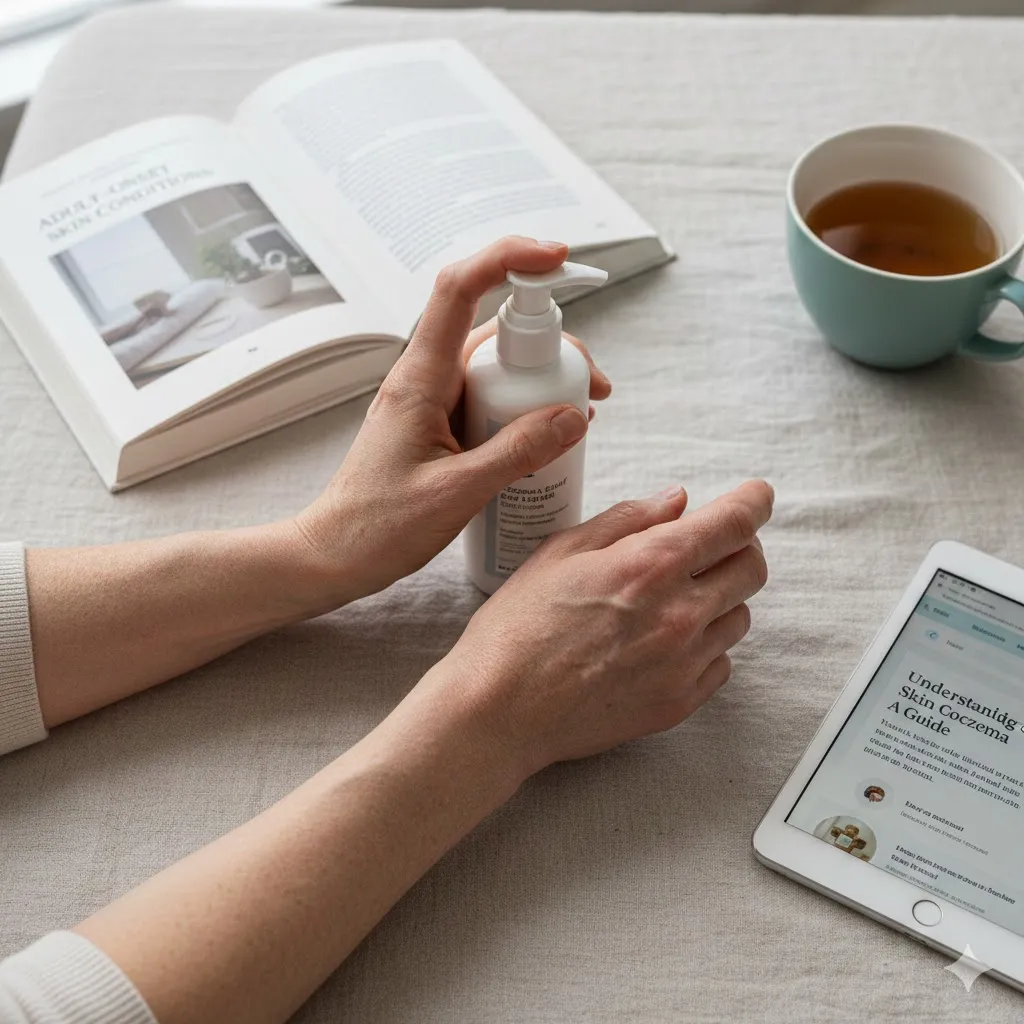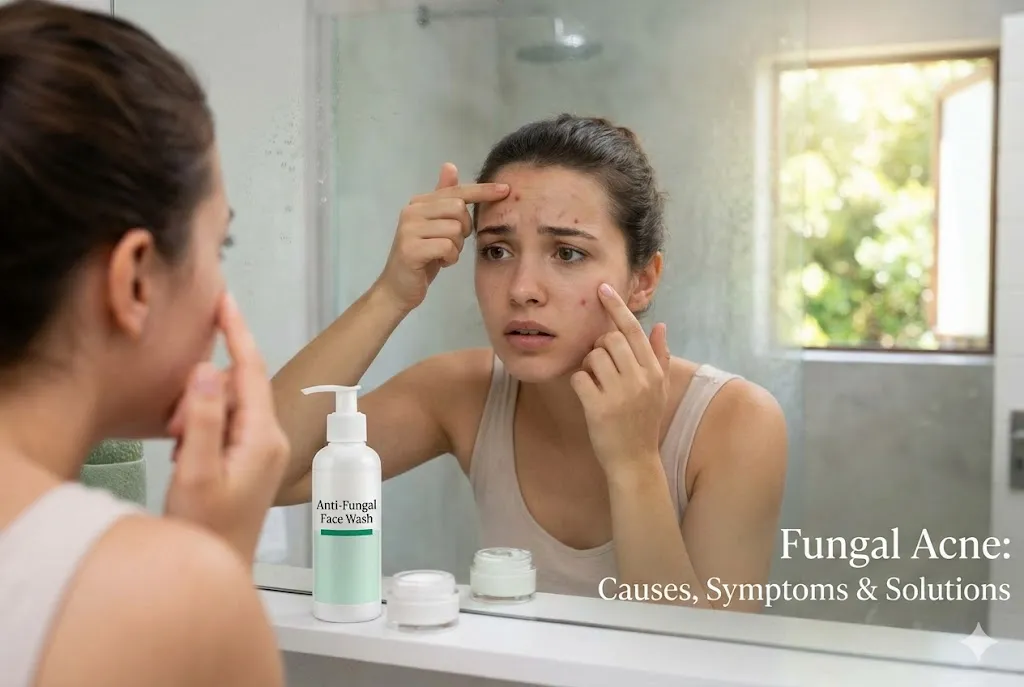Struggling with dark spots, freckles, or uneven skin tone? You're not alone! Excessive melanin in the skin can result in these issues. Though melanin plays an important role in skin protection from UV rays, too much production of it can lead to hyperpigmentation. So, if you are looking to avoid those dark spots and want to get an even skin tone, several methods can be helpful. From topical products and professional treatments to home remedies, our blog will help you learn how to reduce melanin in skin and improve skin health. We will also discuss certain tips to prevent excessive melanin. Let's get started!
5 Proven Ways to Reduce Melanin in Skin
These methods can help you reduce melanin, lessen hyperpigmentation, and achieve an even skin tone.
1. Topical Serums & Creams
Trying topical products is the first way to reduce melanin in your skin. They consist of ingredients that prevent excess melanin production and lighten dark spots. Those topical serums and creams include:
-
Hydroquinone: The effective skin-lightening skincare product to reduce melanin production. However, its prolonged use causes dryness and skin thinning, so always take a dermatologist's advice.
-
Vitamin C (ascorbic acid): According to a study, vitamin C inhibits the action of tyrosinase, an enzyme that triggers melanin production. This, in turn, lightens hyperpigmentation and brightens the skin.
-
Retinoids (Retinol or Tretinoin): Increase skin turnover (rejuvenation) which contributes to the replacement of dead skin cells with new ones. This helps reduce melanin in the outer skin layer.
-
Kojic Acid: Forms the barrier against the production of melanin. This, in turn, helps in skin lightening. Using this acid along with a ceramide-containing moisturizer gives excellent results.
-
Arbutin: Inhibits the activity of an enzyme- "tyrosinase" which plays a key role in melanin synthesis. This helps reduce melanin production and prevent hyperpigmentation.
-
Glycolic & Lactic Acid: Research reports that both acids decrease excessive melanin production by inhibiting the tyrosinase activity. This helps get rid of dead skin cells. Individuals with dry skin type should use lactic acid two times a week.
-
Niacinamide (Vitamin B3): Reduces melanin production by preventing the transfer of melanosomes (melanin-containing bags) from melanocytes (melanin-producing cells).
2. Chemical Peels
This procedure involves applying a potent chemical solution to the skin for exfoliation and dead skin cells removal. The exfoliation helps get off deposited melanin from the top skin layer, exposing the fresh skin. This, as a result, reduces dark spots and gives an even skin tone. The chemical solutions used in this process are:
-
Glycolic acid: Unclog pores, remove dead skin cells and enhance skin texture.
-
Salicylic acid: Helps in exfoliation by breaking the bonds between dead skin cells, thus rejuvenating the skin.
-
Lactic acid: Exfoliate and even out the skin tone by revealing new skin cells.
However, this process has some side effects like burning sensation and redness. So, dermatologists always ask to apply sunscreen as new skin cells easily get exposed to sun damage.
3. Laser Treatments
A laser treatment is the best solution if you are dealing with excessive production of melanin which leads to severe hyperpigmentation. This procedure targets and dissolves the melanin that helps lighten the dark spots and prevent hyperpigmentation. It works by emitting light or focused energy to break down melanin-containing skin cells. These are different types of laser treatment used by dermatologists:
-
Ablative Laser Technology: This works by emitting light energy that removes the top skin layer and stimulates collagen production which lightens the skin color. This type is recommended for people with excessive melanin production.
-
Non-Ablative Laser Technology: This treatment works by emitting laser energy to the deepest skin layer which further triggers collagen production. This results in new skin cell formation. It is recommended for people with mild hyperpigmentation.
-
QSLR (Q-Switched Ruby Laser) Treatment: This laser treatment works by emitting short high light energy (at a wavelength of 694 nm) that is absorbed by melanin cells, causing them to break down in smaller fragments which naturally get removed by the immune system. It is suitable for darker skin tones.
4. Microdermabrasion
This is a minimally invasive procedure that helps exfoliate the outer layer of the skin using a handheld device and reduces melanin. It removes uneven pigmentation and brown spots. This is how it works:
-
The dermatologist cleans with a mild cleanser and then puts a moist gauze over your eyes.
-
They then use a handheld device that releases crystals and collects the dead skin.
-
The device is moved all over the desired area to be treated.
-
Then, the providers wipe the left crystals using a washcloth.
-
At last, a gentle moisturizing cream is applied to the face.
5. Sun Protection
Too much exposure to sunlight triggers melanin production. So, to prevent the further darkening of the skin and pigmentation, make sure to use sunscreen with a broad-spectrum SPF of 30 or above and water-resistant. Sunscreen keeps the skin protected from harmful UV rays and alleviates the trigger of melanin production.
-
When outdoors, reapply sunscreen every 2 hours.
-
Avoid direct sunlight and wear full-sleeved clothes.
Important Considerations:
-
Do a patch test before trying any topical products to avoid allergic reactions or skin irritation.
-
Avoid over-exfoliation as it can worsen pigmentation and cause skin irritation.
-
In case of severe or persistent hyperpigmentation, see a dermatologist for a customized treatment plan.
5 Best Home Remedies To Reduce Melanin
You can also try some home remedies in case of mild dark spots or pigmentation before trying topical products or professional treatments. However, use these remedies with caution, especially for people with sensitive skin to avoid skin irritation.
1. Lemon Juice
Being highly rich in vitamin C, lemon juice can help reduce melanin by inhibiting the action of tyrosinase that forms melanin. Additionally, citrus acid in them helps exfoliate the skin and lighten dark sports. Mix lemon juice and honey, apply to the skin, and leave for 10-15 minutes. But, use it carefully as it can make the skin sensitive to sunlight.
2. Aloe Vera
Aloe vera contains aloesin which is reported to suppress the activity of tyrosinase that contributes to melanin formation. In addition, its soothing effects aid in fading dark spots with time which lighten the skin. Apply aloe vera gel daily for 30 minutes and then wash.
3. Turmeric
According to one finding, the active compound called "curcumin" in turmeric may decrease melanin synthesis. This compound works by inhibiting the action of tyrosinase that suppresses the melanocytes (melanin-producing cells) to form excessive melanin. Mix turmeric and milk and apply its paste regularly.
4. Green tea
Green tea is rich in epigallocatechin gallate (EGCG) which has been effective in alleviating the accumulation of melanin in the skin layer. This compound functions by interrupting the action of tyrosinase. Brew a green tea, apply it on your face using a cotton ball, leave for 10-15 minutes, and wash it off.
5. Licorice Extract
Glabridin in licorice extract can inhibit the action of tyrosinase and alleviate sun-induced pigmentation. It also contains liquiritin that also dissolves melanin in the skin. Make a mask by mixing licorice extract or powder with honey and curd, apply it to your face for 10-15 minutes, and clean it off.
Home remedies to avoid:
Avoid these home remedies as they can lead to redness, irritation, or damage.
-
hydrogen peroxide
-
ammonia
-
bleach
Pro Tips by Dermatologists
A diet also has a major role in reducing melanin production. Consuming antioxidant-dense foods can help balance free radicals which are responsible for the stimulation of melanin production, leading to darkened skin. So, add these antioxidant-rich foods to your diet:
-
Berries: Being loaded with vitamin C and many potent antioxidants, blueberries, raspberries, and strawberries can reduce melanin.
-
Citrus Fruits: Grapefruits, lemons, and oranges are highly rich in vitamin C which contributes to skin lightening and inhibition of melanin production.
-
Nuts and Seeds: Flaxseeds, sunflower seeds, and almonds are excellent sources of vitamin E, thus, keeping the skin protected from UV damage and decreasing melanin production.
Can You Reduce Melanin Permanently?
No, it's impossible to reduce melanin permanently as melanin is a crucial part of the body. It protects the skin against sunlight, gives color to the skin, prevents DNA damage, fights off harmful free radicals, and regulates skin temperature. You can prevent its appearance by using topical products, applying sunscreen, consuming a balanced diet, and hydrating well. However, reducing the excess amount of melanin from the skin can lead to these skin-related problems:
-
Increased sun damage
-
Uneven skin texture
-
Sensitive skin
-
Redness or itching
-
Vitiligo (white patches)
-
Wrinkles
-
Skin discoloration
-
Skin cancer risk
So, if you want to effectively and safely reduce melanin, always consult with the dermatologist.
Best Approach: Focus on healthy skin maintenance, not extreme whitening treatments.
Potential Causes of Increased Melanin Levels
Understanding the causes of increased melanin can help you avoid it before it causes more skin-related issues:
-
Excessive sun exposure
-
Hormonal changes
-
Genetics
-
Inflammation or Injury
-
Nutritional deficiency
-
Age
-
Medications like oral contraceptives
These factors cause uneven distribution or overproduction of melanin in your skin.
Tips to Prevent Excessive Melanin Production
Consider these tips to prevent too much production of melanin in the skin and maintain healthy skin:
-
Always Apply Sunscreen: Use broad-spectrum and water-resistant SPF 30 or higher each day to prevent melanin production due to excessive sun exposure.
-
Avoid Sun During Peak Hours: Avoid outdoor visits during peak hours (10 AM-4 PM) of sun exposure as ultraviolet (UV) rays are very strong.
-
Wear Protective Clothes: Use long-sleeved clothes, hats, or quality sunglasses to protect your skin from harmful ultraviolet (UV) rays.
-
Add Antioxidants to Your Skincare Routine: Use products rich in Vitamin C, green tea, or niacinamide as they inhibit melanin production.
-
Consume a Healthy Diet: A diet rich in lean proteins, fruits, whole grains, and veggies can provide vital nutrients that help manage melanin production and improve overall skin health.
-
Stay Hydrated: Hydration maintains the natural barrier of the skin that reduces melanin production and prevents sun damage and hyperpigmentation.
-
Use Gentle Skincare Products: Choose products that suit your skin type. Harsh products can trigger melanin production and cause irritation.
-
Follow a Consistent Skincare Routine: Cleanse, exfoliate, apply vitamin C, moisturize, and then use sunscreen every day to minimize dark spots, support the skin's natural barrier, and reduce melanin. Consider retinoids at night for dead skin cells removal.
Final Thoughts
So, how to reduce melanin in skin? Well, there are several ways; from topical products to professional treatment. Topical serums or creams like glycolic acid, lactic acid, retinoids, etc., and professional treatments like chemical peels or laser therapies can effectively help decrease melanin. In some cases, home remedies can also work but if there is excessive melanin production that is causing severe hyperpigmentation, see a dermatologist.
You need to focus more on preventing melanin production by consuming a balanced diet, applying sunscreen, and maintaining a consistent skincare routine.
Read Also: 7 Best Hyperpigmentation Treatment Options in 2025
Frequently Asked Questions
How can I reduce melanin in my skin naturally?
By using home remedies, consuming a balanced diet, and limiting sun exposure, you can naturally reduce melanin.
Which drink reduces melanin?
Lemon juice and green tea are the best drinks for melanin reduction in the skin as they help prevent melanin accumulation.
Can beetroot reduce melanin?
Yes, due to being highly rich in vitamin C, beetroot can reduce melanin, lighten dark spots, and reduce hyperpigmentation.
What vitamins reduce melanin?
Vitamin C and B12 can reduce melanin by inhibiting the action of tyrosinase which contributes to melanin formation.
Does rose water reduce melanin?
The antioxidant effect of rose water reduces melanin which prevents brown spots and premature aging.
Reviewed by







